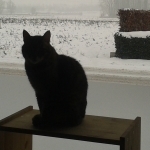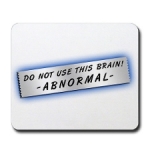is this also some kind of apnea ?
is this also some kind of apnea ?
I am using F & P autopap 254 since two weeks. Still, I do not feel too great - maybe need to try some masks other than nasal pillow.
anyways, has somebody come across this kind of feeling ? -
When I am drifting into sleep, I feel I hold my breath and after 10-15 seconds breath with a snort/gasp. I don’t know what happens when I am asleep though.
Is this some kind of OSA ?
thanks.
anyways, has somebody come across this kind of feeling ? -
When I am drifting into sleep, I feel I hold my breath and after 10-15 seconds breath with a snort/gasp. I don’t know what happens when I am asleep though.
Is this some kind of OSA ?
thanks.
chasing my dreams SSSSS
Re: is this also some kind of apnea ?
It may be sleep onset centrals. Do you have the software to see what happens while you are asleep? Did your sleep study show any centrals?
Diagnosed 9/4/07
Sleep Study Titrated to 19 cm H2O
Rotating between Activa and Softgel
11/2/07 RemStar M Series Auto with AFlex 14-17
10/17/08 BiPAP Auto SV 13/13-23, BPM Auto, AHI avg <1
Sleep Study Titrated to 19 cm H2O
Rotating between Activa and Softgel
11/2/07 RemStar M Series Auto with AFlex 14-17
10/17/08 BiPAP Auto SV 13/13-23, BPM Auto, AHI avg <1
Re: is this also some kind of apnea ?
when you relax and are about to drift off to sleep, do you notice that after you exhale you simply dont inhale again?
Is that what you mean?
Is that what you mean?
_________________
| Mask: Swift™ FX Nasal Pillow CPAP Mask with Headgear |
| Humidifier: S9™ Series H5i™ Heated Humidifier with Climate Control |
| Additional Comments: sleep study: slept 66 min in stage 2 AHI 43.3 had 86 spontaneous arousals I changed pressure from 11 to 4cm now no apap tummy sleeping solved apnea |
Re: is this also some kind of apnea ?
Yes, but only for a few seconds - could be around ten seconds. I do not notice this often though.elena88 wrote:when you relax and are about to drift off to sleep, do you notice that after you exhale you simply dont inhale again?
Is that what you mean?
I have the software to monitor my apap machine and I will post the log here. There was no centrals in the sleep study.
chasing my dreams SSSSS
Re: is this also some kind of apnea ?
If it feels like it is obstructive (which a "gasp" would suggest), it may be that ramp is set too low for you, if you are using ramp. (Ramp is a feature some machines have that lowers the pressure for comfort reasons for a set amount of time as you fall asleep.) If it feels more like forgetting to breathe, don't worry about it--it should fix itself over time. Or even if it doesn't, it is no biggie. It just happens with some people.
"Be who you are and say what you feel, because those who mind don't matter and those who matter don't mind." - Often credited (unsourced) to my favorite doctor, Dr. Seuss.
Re: is this also some kind of apnea ?
Okay, I understand what you are talking about..
You are relaxed, you inhale, exhale, then you inhale, exhale, and "forget" to do the next inhale for about ten seconds or more seconds.. .
I do this during the day and night, and did it on my sleep study too..
I dont know if there is a name for this or not, when I do it, I call it "lazy breathing"
Its not obstructive apnea, because the cause is not an obstruction..
are you a shallow breather?
You are relaxed, you inhale, exhale, then you inhale, exhale, and "forget" to do the next inhale for about ten seconds or more seconds.. .
I do this during the day and night, and did it on my sleep study too..
I dont know if there is a name for this or not, when I do it, I call it "lazy breathing"
Its not obstructive apnea, because the cause is not an obstruction..
are you a shallow breather?
_________________
| Mask: Swift™ FX Nasal Pillow CPAP Mask with Headgear |
| Humidifier: S9™ Series H5i™ Heated Humidifier with Climate Control |
| Additional Comments: sleep study: slept 66 min in stage 2 AHI 43.3 had 86 spontaneous arousals I changed pressure from 11 to 4cm now no apap tummy sleeping solved apnea |
Re: is this also some kind of apnea ?
"Transition to Sleep
"The transition from wakefulness to sleep is an inherently unstable period . . . With sleep onset, there is a loss of the wakefulness stimulus and behavioral influences. In addition, several respiratory control mechanisms are down regulated at sleep onset. Upper airway (UA) dilator and respiratory pump muscle tone is reduced, and there is an accompanying increase in UA resistance leading to a reduction in ventilation for a given level of drive. Chemosensitivity is also likely reduced at sleep onset. Although of variable magnitude and rate, these normal physiologic responses occur in all individuals. Should the withdrawal of the wakefulness drive be rapid at sleep onset, this in itself may be sufficient to promote hypopnea/apnea due to the delay required to elicit an appropriate compensatory response from the chemoreceptors. Thus, the dysrhythmic breathing characteristics observed even in healthy individuals at sleep onset likely relates to a combination of state instability and the associated changes in chemoreceptor sensitivity."
http://www.ncbi.nlm.nih.gov/pmc/articles/PMC2287191/
Underline mine.
Such "apneas" are generally ignored in sleep studies, since they are completely normal.
"The transition from wakefulness to sleep is an inherently unstable period . . . With sleep onset, there is a loss of the wakefulness stimulus and behavioral influences. In addition, several respiratory control mechanisms are down regulated at sleep onset. Upper airway (UA) dilator and respiratory pump muscle tone is reduced, and there is an accompanying increase in UA resistance leading to a reduction in ventilation for a given level of drive. Chemosensitivity is also likely reduced at sleep onset. Although of variable magnitude and rate, these normal physiologic responses occur in all individuals. Should the withdrawal of the wakefulness drive be rapid at sleep onset, this in itself may be sufficient to promote hypopnea/apnea due to the delay required to elicit an appropriate compensatory response from the chemoreceptors. Thus, the dysrhythmic breathing characteristics observed even in healthy individuals at sleep onset likely relates to a combination of state instability and the associated changes in chemoreceptor sensitivity."
http://www.ncbi.nlm.nih.gov/pmc/articles/PMC2287191/
Underline mine.
Such "apneas" are generally ignored in sleep studies, since they are completely normal.
"Be who you are and say what you feel, because those who mind don't matter and those who matter don't mind." - Often credited (unsourced) to my favorite doctor, Dr. Seuss.
Re: is this also some kind of apnea ?
thanks for that, who. So what we have up until now been calling "sleep/wake onset central apnea's" should instead be lumped into a category called "dysrhythmic breathing characteristics"? Still sounds like they're describing a combination of a central and an obstructive apnea all rolled into one! Most of our machines will flag these as CAs, most likely due to the lack of respiratory effort (or "clear airway"). So I assume this is associated with the chemosensitivity (to what? CO2?)....
PR System One APAP, 10cm
Activa nasal mask + mouth taping w/ 3M micropore tape + Pap-cap + PADACHEEK + Pur-sleep
Hosehead since 31 July 2007, yippie!
Activa nasal mask + mouth taping w/ 3M micropore tape + Pap-cap + PADACHEEK + Pur-sleep
Hosehead since 31 July 2007, yippie!
Re: is this also some kind of apnea ?
Yes, it is akin to forgetting to breathe at the onset of sleep. Sometimes, it could also happen during daytime if I am engrossed in some thoughts though not very sure.
It's a bit hard to remember those things as it happens for a few seconds and one does not give a thought to it later on.
So, I will let is pass as "layz breathing". Thank you who & elena88 for your informed inputs.
later on, I will post the logs from my apap machine and I hope informed folks like you will again come to my rescue.
thanka again !
It's a bit hard to remember those things as it happens for a few seconds and one does not give a thought to it later on.
So, I will let is pass as "layz breathing". Thank you who & elena88 for your informed inputs.
later on, I will post the logs from my apap machine and I hope informed folks like you will again come to my rescue.
thanka again !
chasing my dreams SSSSS
Re: is this also some kind of apnea ?
As I understand it, yeah, CO2, mostly, I guess, but also O2, depending on patient, and probably other stuff the scientists don't even know about yet.echo wrote:thanks for that, who. So what we have up until now been calling "sleep/wake onset central apnea's" should instead be lumped into a category called "dysrhythmic breathing characteristics"? Still sounds like they're describing a combination of a central and an obstructive apnea all rolled into one! Most of our machines will flag these as CAs, most likely due to the lack of respiratory effort (or "clear airway"). So I assume this is associated with the chemosensitivity (to what? CO2?)....
"Sleep onset central" is as good a name as any, for me, for now. I think of it as the body stepping on the clutch while shifting gears between states and stages. Some bodies are better with the clutch than others, but it's all good, as long as it gets where it is going and the gears don't get stripped.
And if they happen during ramp, they may not be counted on home machines either. I don't know.
"Be who you are and say what you feel, because those who mind don't matter and those who matter don't mind." - Often credited (unsourced) to my favorite doctor, Dr. Seuss.
Re: is this also some kind of apnea ?
oh who, facinating stuff there!
greenfx, good luck tonight! Cant wait to see your graphs, but Im learning about this just now too!
I just wanted to tell you also I have something my pulmanoligist called "reactive airway disease"
I dont know if you have any other breathing issues, or a history of asthma, but something to think about in case it could be related..
HI echo!
greenfx, good luck tonight! Cant wait to see your graphs, but Im learning about this just now too!
I just wanted to tell you also I have something my pulmanoligist called "reactive airway disease"
I dont know if you have any other breathing issues, or a history of asthma, but something to think about in case it could be related..
HI echo!
_________________
| Mask: Swift™ FX Nasal Pillow CPAP Mask with Headgear |
| Humidifier: S9™ Series H5i™ Heated Humidifier with Climate Control |
| Additional Comments: sleep study: slept 66 min in stage 2 AHI 43.3 had 86 spontaneous arousals I changed pressure from 11 to 4cm now no apap tummy sleeping solved apnea |
Re: is this also some kind of apnea ?
Elena, do you think your reactive airway disease affects your alertness or ability to obtain effective PAP therapy in any way?
Re: is this also some kind of apnea ?
Who's post is right on the money.
I wrote a topic about the same "stuff" at http://www.sleepandcpap.blogspot.com Take a look at the topic called "Central Apneas...normal?" it should be in June.
I wrote a topic about the same "stuff" at http://www.sleepandcpap.blogspot.com Take a look at the topic called "Central Apneas...normal?" it should be in June.
For commentary from a 10 year Sleep Technologist visit my blog at: Recent Topics: Picture of the new baby/ Switching to Swift FX
http://www.sleepandcpap.blogspot.com
http://www.cpapmaskreview.blogspot.com
http://www.facebook.com/sleepandcpap
http://www.sleepandcpap.blogspot.com
http://www.cpapmaskreview.blogspot.com
http://www.facebook.com/sleepandcpap
Re: is this also some kind of apnea ?
LoQ wrote:Elena, do you think your reactive airway disease affects your alertness or ability to obtain effective PAP therapy in any way?
Oh that is a good question..
Im sure having a heck of a time sometimes, I can tell you!
I am a shallow breather, I take way to long to exhale sometimes, and I am aware of my breathing during the day, because it doesnt feel
natural, I have to think about.. I have to work at it.. and my exhaling is weak and I notice I take twice as long to exhale as my husband.
Even that being said, I managed to exel in sports, and had taught one for thirty years.
Sometimes I feel like Im doing battle with the machine while Im awake if the pressure is above five.
I sleep thru the higher pressures, but I dont feel rested after I wake up..
If I take twice as long to exhale, I dont know if that is giving me trouble or what, maybe..
other than that, its not a big deal, its sort of like having asthma only I react to just about anything, and asthma meds dont work on it..
but the wheezing goes away as fast as it starts, unlike asthma.. where you can end up in the hospital, so Im pretty fortunate.
I dont think RAD is a great match for OSA though!
_________________
| Mask: Swift™ FX Nasal Pillow CPAP Mask with Headgear |
| Humidifier: S9™ Series H5i™ Heated Humidifier with Climate Control |
| Additional Comments: sleep study: slept 66 min in stage 2 AHI 43.3 had 86 spontaneous arousals I changed pressure from 11 to 4cm now no apap tummy sleeping solved apnea |
Re: is this also some kind of apnea ?
Thanks for the reply, and I'm sorry you are having so much trouble with it. I have RAD and asthma, too, though I don't think I'm struggling in the ways that you describe. I have noticed that I feel more energetic since I started taking a steroid (inhaled).
I think one of the ways that my goals are not aligned with what doctors are trained for is that they are trained to save and extend lives. I don't really care about that as much as I do about the quality of life. So when I ask my pulmonologist "is 94% spo2 OK?" he says "yes" because he's thinking about whether I'm in danger of decompensating at that level. Clearly not, but it's pretty clear to me that I feel a lot better at 97% than at 94%.
I think one of the ways that my goals are not aligned with what doctors are trained for is that they are trained to save and extend lives. I don't really care about that as much as I do about the quality of life. So when I ask my pulmonologist "is 94% spo2 OK?" he says "yes" because he's thinking about whether I'm in danger of decompensating at that level. Clearly not, but it's pretty clear to me that I feel a lot better at 97% than at 94%.













